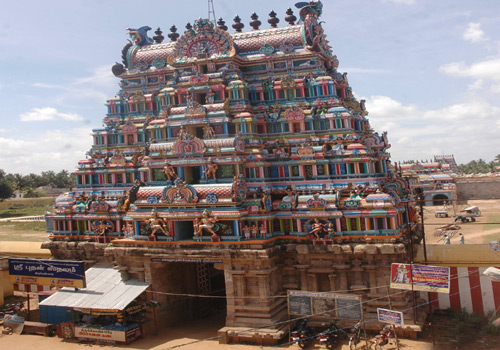Swetharanyeswarar Temple is a Hindu temple located in the town of Thiruvengadu near Sirkazhi. The main deity is Shiva-Swetharanyeswarar ("lord of white forest") and the goddess is Brahma Vidya ambal. There is a separate Sannidhi for Bhudhan (mercury). The temple is quite large and all four important Saivite saints have sung in praise of this lord. Swetharanyeswarar is one of the main god who is being prayed in this village.Thiruvengadu village is also famous for its unique structure of pools in temples.
The temple also contains 3 holy tanks or theerthams known as- Surya
theertham, Agni theertham and Chandra theertham. It is said that these
theerthams were formed from 3 drops that dropped from the eyes of God
Shiva during his dance act.
It is a belief that who takes bath in all these pools, the one will be
free from their problems like diseases, delay in marriage, etc.,.
Another rare feature is that the deity is present here with five faces
viz Easanam, Tatpurusham, Aghoram, Vamadevam and Sadyojatam. They
represent direction and an aspect of Lord Shiva. Easanam is facing the
sky and represents purity, Vamdevam faces north and represents sustenance, Tatpurisha faces east and represents spirituality that has
destroyed the ego, Aghoram faces south and represents the destructive and regenerative aspect of Shiva, Sadyojatam faces west and represents creation.
There are many festivals which are being celebrated in this village. It
includes the chariot festival which is celebrated every year in the
month of February. This Chariot festival is celebrated for 10 days. On
5th day a special occasion is celebrated for Lord Agora Murthi.
Swetharanyeswarar Temple is the 4th Navagraha Sthalam amongst the nine Navagraha temples
situated in Tamil Nadu. The temple is the home for Mercury planet (or Budha).
Lord Shiva is the presiding idol and is worshipped here as Swetharanyeswarar. Goddess Parvati is worshipped as Brahmavidyanayaki.
This Swetharanyeswarar Temple is one of the 6 most sacred places on the banks of river Manikanigai and Cauvery which is considered as equivalent to the temple at Varanasi.
This is adi(first) chidambaram because before dancing shiva in
chidambaram he done the first dance here.
Those
who visit Thiruvengadu will find relief from puthira dosham, poor
studies, mental instability, nervous disorders,knowledge, music,
astrology, maths, sculpting, medicine, language skills are the
beneficial aspects of Budan.
Lord Shiva is known to have performed his seven forms of dance or
Tandavam viz Ananda tandavam, Sandhya tandavam, Samhara tandavam,
Tripuranta tandavam, Urdhva tandavam, Bhujanga tandavam and Lalita
tandavam here.
Do:
- Do pray your Ishta Devata before pilgrimage to Temple.
- Do contact Temple Devasthanam information centre for enquiry, temple information and for Pooja details etc.
- Do reserve your travel and accommodation at Temple well in advance.
- Do bath and wear clean clothes before you enter the temple.
- Do concentrate on God and Goddess inside the temple.
- Do maintain silence and recite Om Namahsivaya or your Istamantram to yourself inside the temple.
- Do observe ancient custom and traditions while in Temple.
- Do respect religious sentiments at Temple.
- Do deposit your offerings in the hundi only.
Dont's:
- Do not come to Temple for any purpose other than worshipping of God and Goddess.
- Do not smoke at Temple.
- Do not consume alcoholic drinks at Temple.
- Do not eat non-vegetarian food in the Kshetram.
- Do not approach mediators for quick Darshanam. It may cause inconvenient to others.
- Do not carry any weapon inside the temple.
- Do not wear any head guards like helmets, caps, turbans and hats inside the temple premises.
- Do not perform Sastanga Pranama inside the Sanctum Sanctorum.
- Do not take much time while performing Sparsa Darshanam to God in Garbhagriha.
- Do not buy spurious prasadams from street vendors.
- Do not encourage beggars at Temple.
- Do not spit or create nuisance in the premises of the temple.
